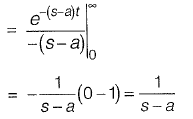Laplace Transforms | Topic wise GATE Past Year Papers for Civil Engineering - Civil Engineering (CE) PDF Download
Question 1: The Laplace transform F(s) of the exponential function. f(t) = eat when t > 0, where a is a constant and (s - a) > 0, is
[2018 : 2 Marks, Set-II]
Answer: (b)
Solution: Taking Laplace transform, we have

Question 2: The Laplace transform of sinh(at) is 
[2019 : 1 Mark, Set-II]
Answer: (c)
Solution:
The document Laplace Transforms | Topic wise GATE Past Year Papers for Civil Engineering - Civil Engineering (CE) is a part of the Civil Engineering (CE) Course Topic wise GATE Past Year Papers for Civil Engineering.
All you need of Civil Engineering (CE) at this link: Civil Engineering (CE)
FAQs on Laplace Transforms - Topic wise GATE Past Year Papers for Civil Engineering - Civil Engineering (CE)
| 1. What is a Laplace transform? |  |
Ans. A Laplace transform is a mathematical operation that transforms a time-domain function into a complex frequency-domain representation. It is commonly used to solve differential equations and analyze linear systems in engineering and physics.
| 2. How is a Laplace transform calculated? |  |
Ans. To calculate a Laplace transform, you need to apply the integral operator to the given function. The integral is taken from zero to infinity, and the result is multiplied by the exponential term, e^(-st), where s is a complex variable representing the frequency. The resulting function is the Laplace transform of the original function.
| 3. What are the advantages of using Laplace transforms in solving differential equations? |  |
Ans. Laplace transforms provide a powerful tool for solving differential equations because they convert the differential equations into algebraic equations in the frequency domain. This simplifies the problem-solving process by eliminating the need for complex differentiation and integration techniques, making it easier to find solutions.
| 4. Can Laplace transforms be used for non-linear systems? |  |
Ans. The Laplace transform technique is mainly applicable to linear systems because it relies on the linearity property of the transform. However, it is possible to use approximation methods or nonlinear extensions of the Laplace transform, such as the Volterra series, to analyze and solve some non-linear systems.
| 5. Are Laplace transforms reversible? |  |
Ans. Yes, Laplace transforms are reversible. The inverse Laplace transform allows us to convert a function in the frequency domain back to the time domain. By applying the inverse Laplace transform, we can obtain the original time-domain function from its Laplace transform, making it a useful tool for solving differential equations and analyzing systems.
Related Searches





















